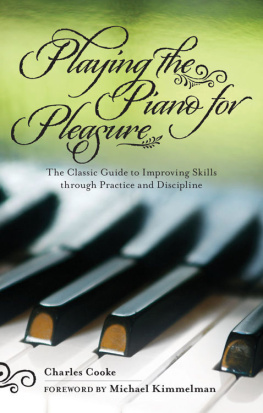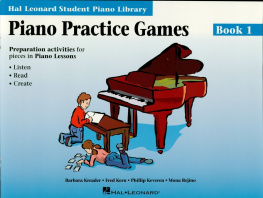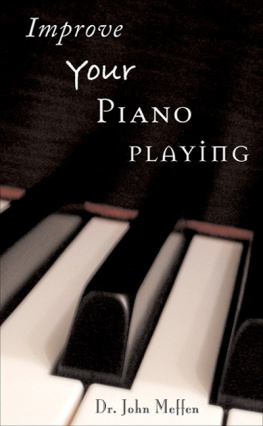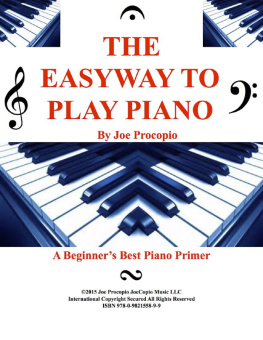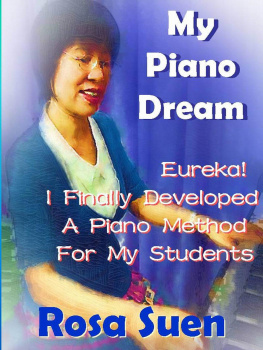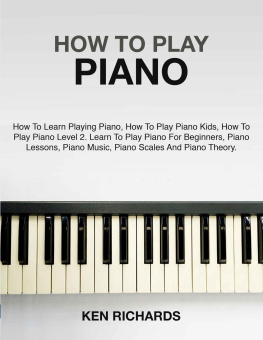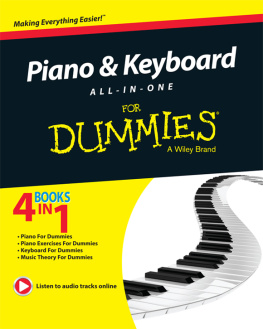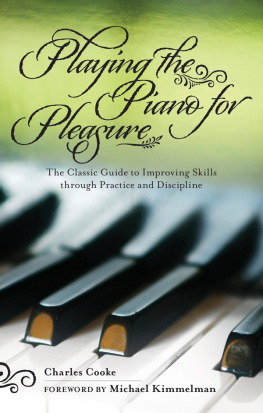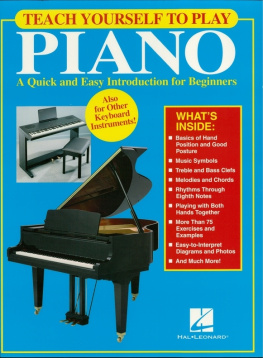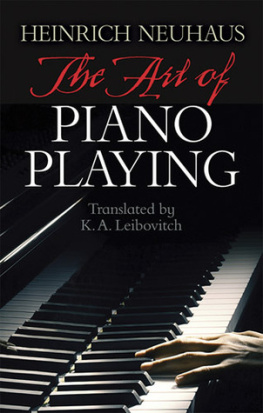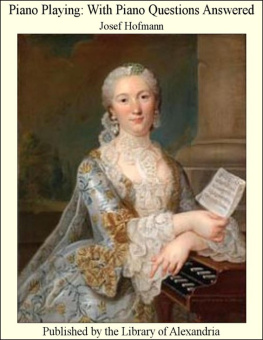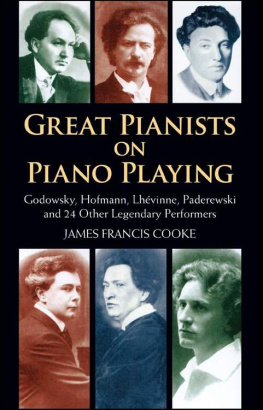PUBLISHERS NOTE
From the 1960 edition
On the jacket of the original edition of Playing the Piano for Pleasure we wrote:
The author of this book is one of the star reporters of The New Yorker. He is also a novelist and the author of numerous short stories and innumerable magazine and newspaper articles, many of them about music. Writing is his profession. Playing the piano is his hobbya serious adult hobby. The result is, in effect, a book by an amateur addressed to other amateurs. It is written lightly, persuasively, humorously, inspiringly. It is full of concrete suggestions and instructions, based not only on the author's own experiences at the keyboard, but also on research conducted by interviewing such master pianists as Horowitz, Hofmann, Schnabel, Brailowsky, Arrau, and Rosenthal. These conversations contribute much toward the generous potpourri of pianistic advice of the highest caliber in this book. The wisdom of these giants is accompanied by gleanings from the writings of Liszt, Anton Rubinstein, Leschetitzky, Teresa Carreo, Tobias Matthay, and Paderewski.
In the years between the original publication of Playing the Piano for Pleasure and preparation of the present edition, Charles Cooke led a life best described, perhaps, as miscellaneous. In World War II, after twelve years on The New Yorker staff, specializing in stories about concert music and musicians, the opera, the theater, and the circus, he joined the Air Force. Assigned to intelligence work, he rose from private to his present rank of lieutenant colonel (retired), then became associate editor of, in turn, Esquire and Holiday, then historian for the Far East Air Force in Tokyo, Korea, and Honolulu. He is now a writer on nuclear radiation for the Radiological Health Division of the U. S. Public Health Service.
James Thurber, in his book The Years with Ross, wrote:
Ross was determined to make The Talk of the Town the out-standing department of the magazine, and it was a great help when God sent him Charles Cooke, an efficient and tireless young reporter whose career on The New Yorker was unique. Charles turned in more than twelve hundred stories; no other reporter ever equaled his energy or came close to his output. Ross praised him as a peerless reporter, but once remarked uneasily to me: I'm surrounded by piano players; why we haven't got a piano in this joint, I'll never know. Ross was referring to E. B. White, William Shawn, John McNulty, Peter Arno, and Charles Cooke.
Today, Colonel Cooke lives in Washington, D. C. He gets in the daily hour of systematized piano practice which he recommends for the startling results he all but guarantees in this unique and widely popular book. He also does a daily hour of duo-piano practice with his charming wife, Anne, an amateur pianist as accomplished as himself. It wasn't always possible, he says, to practice systematically while orbiting around the globe during and after World War II, but he claims that a piano to practice on can almost always be found by an amateur pianist if the hobbyist's gleam in his eye is sufficiently fierce. The best practicing I ever did, says Charles Cooke, took place in the little fishing village of Keflavik, Iceland, and in the little farming village of Pyongtaek, Korea.
Copyright 2011 by Elizabeth Rogers
All Rights Reserved. No part of this book may be reproduced in any manner without the express written consent of the publisher, except in the case of brief excerpts in critical reviews or articles. All inquiries should be addressed to Skyhorse Publishing, 307 West 36th Street, 11th Floor, New York, NY 10018.
Skyhorse Publishing books may be purchased in bulk at special discounts for sales promotion, corporate gifts, fund-raising, or educational purposes. Special editions can also be created to specifications. For details, contact the Special Sales Department, Skyhorse Publishing, 307 West 36th Street, 11th Floor, New York, NY 10018 or info@skyhorsepublishing.com.
Skyhorse and Skyhorse Publishing are registered trademarks of Skyhorse Publishing, Inc., a Delaware corporation.
www.skyhorsepublishing.com
10 9 8 7 6 5 4 3 2 1
Library of Congress Cataloging-in-Publication Data is available on file. ISBN: 978-1-61608-230-7
Printed in China
To the Memory of
Olga Samaroff Stokowski
and
William Kapell
CONTENTS
Part One
GOALS
Part Two
MEANS
PREFACE TO THE
ORIGINAL EDITION
This book is frankly intended as inspirational. In it I have tried to communicate my indelible enthusiasm for musicin particular for the infinitely varied music that can be drawn from that noble, self-sufficient instrument, the piano. It Is a personal book, for the field open to the amateur pianist is so vast that any book on the subject can only tell of the adventures of one amateur who has happily and busily roamed this field. It is my hope that my experiences may provide food for thought and action to three great groups: adults who have played the piano all their lives but would like to improve and expand their playing; adults who studied the piano in their youth, gave it up, and would now like to resume; and adult beginners.
One evening recently, after finishing my regular daily hour of piano practice, I had a sudden startling awareness of the hundreds of thousands of men and women who, like me, love music and love to play the piano; and who, like me, would like to play the piano more and better all the rest of their lives. So I decided to assemble my ideas on this subjecttogether with the written and the spoken ideas of master pianists and master teachers which I have found illuminating, inspiring, and concretely useful. You hold the result in your hand. I hope with all my heart that you will like it and find it useful. If you play, or used to play, it provides a plan for improving and expanding your playinga workable plana plan which has worked, for me. If you do not play but would like to, a teacher is of course essential, but the value to you of this book should increase in proportion to the progress you make. I suggest that adult beginners read the short first partGoalsfor a quick view (it will pleasantly surprise them, I think) of the achievements that amateur pianists may reasonably aspire to; and I suggest that these adult beginners return later on to read the longer second partMeans. To any who may feel that mature years are too late to begin piano study, I should like to quote one opinion: The age of the student is immaterial. Provided there is gift and intelligence, age need not stand in your way. If you are endowed with strong musical gifts in the abstract, you will achieve results superior to those attained by younger people with less talent. Those are the words of Josef Hofmann.
I was ten years old when, in my home in Cooperstown, N. Y., I first began to listen intently to my sister, Lucy E. Cooke, who, then as now, played the piano beautifully. For example, her playing of Beethoven's Pathtique Sonata invariably put me in an emotional mist. To be able to play that sonata seemed to me one of the most worth-while and glamorous achievements a human being could aspire toa view I still hold. When I was eleven, an indulgent uncle made me a Christmas present of piano lessons. I enjoyed everything about them but the practicing, except during a fortunate period when my teacher was Katherine Ruth Heyman, who was then head of the music department of the Knox School in Cooperstown. Throughout my two years with this distinguished artist, who is world-famous for her interpretations of the music of Scriabin, I enjoyed even the practicing. During college and the first half of the sixteen years I lived in New York City, my interest in piano study dozed, only to awaken suddenly and permanently when I had the unusual good fortune of being accepted as a private pupil by James Friskin, noted concert pianist and member of the faculties of the Institute of Musical Art and the Juilliard Graduate School.

